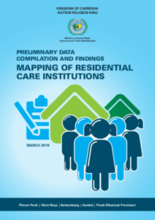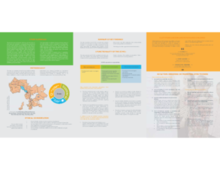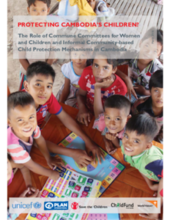This country page features an interactive, icon-based data dashboard providing a national-level overview of the status of children’s care and care reform efforts (a “Country Care Snapshot”), along with a list of resources and organizations in the country.
demographic_data
childrens_living_arrangement
children_living_without_bio
social_work_force
key_stakeholders
Key Stakeholders
Add New DataOther Relevant Reforms
Add New Datadrivers_of_institutionalisation
Drivers of Institutionaliziation
Add New Datakey_research_and_information
Key Data Sources
Add New DataMapping of residential care facilities in the capital and 24 provinces of the kingdom of Cambodia
National estimation of children in residential care institutions in Cambodia: A modelling study
Prevalence and number of children living in institutional care: global, regional, and country estimates
Shaping the national social protection strategy in Cambodia: Global influence and national ownership
Towards a Social Protection Strategy for the Poor and Vulnerable: Outcomes of the consultation process
Country Care Profile: Cambodia
Acknowledgements
Data for this country care snapshot was contributed by partners at Family Care First and UNICEF Cambodia.
Displaying 181 - 190 of 285
Cambodia's Ministry of Social Affairs, Veterans and Youth Rehabilitation (MoSVY) conducted a mapping exercise to address a lack of information on the number of residential facilities providing care for children.
This Study Brief provides a brief snapshot of the findings from a study of the functionality of Commune Committees for Women and Children (CCWCs) in Cambodia.
This study was aimed at filling a gap in information on Commune Committees for Women and Children (CCWCs) and their function. This study examines the successes of CCWCs in implementing and achieving policy goals, and the roles they play in linking children and families to child protection services.
In this video, Australian politician, Alannah McTiernan, delivers a speech to Parliament discussing the negative impact of Australians volunteering and visiting orphanages in Cambodia. McTiernan notes that across Western Austra
This article describes the alarming trend of poor families placing their children in orphanages in Cambodia, in the hopes of providing them with better educational and other opportunities.
A new video describes a Mailman School-led study to assess the size of the problem. Interspersed with footage of children in informal settlements and orphanages, researchers and officials describe the growth of residential care facilities in Cambodia, many which are operated or funded by foreign charities, including religious groups.
This blog post by UNICEF describes how the Disability Rights Initiative-Cambodia, a joint Australian Government-United Nations program to improve quality of life for children with disability and their families, is having an impact for one family in Cambodia.
Australian politician Lunda Reynolds, a Senator for Western Australia, issued a press release warning parents and schools contemplating helping Cambodian orphanages to proceed with caution to ensure they are not unwittingly taking part in “orphanage tourism." The Senator recently visited Cambodia to look at Australian aid projects.
This article describes growing skepticism around the value of "voluntourists" for local communities around the work, and many NGOs are questioning the unregulated industry that brings many young, unqualified westerners to developing countries. Often, volunteers are ineffective in providing help to communities, and sometimes can even pose danger to the community members or themselves.
This short video by GHR presents information on the Children in Familes program with a focus on Cambodia. GHR's grantees are supporting child protection interventions that strengthen families in order to prevention separation of children from their families.



